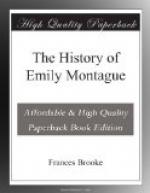That I have amused myself a little in the dowager way, I am very far from denying; but you will observe, it was less from taste than the principle of doing as little mischief as possible in my few excursions to the world of gallantry. A little deviation from the exact rule of right we men all allow ourselves in love affairs; but I was willing to keep as near it as I could. Married women are, on my principles, forbidden fruit; I abhor the seduction of innocence; I am too delicate, and (with all my modesty) too vain, to be pleased with venal beauty: what was I then to do, with a heart too active to be absolutely at rest, and which had not met with its counterpart? Widows were, I thought, fair prey, as being sufficiently experienced to take care of themselves.
I have said married women are, on my principles, forbidden fruit: I should have explained myself; I mean in England, for my ideas on this head change as soon as I land at Calais.
Such is the amazing force of local prejudice, that I do not recollect having ever made love to an English married woman, or a French unmarried one. Marriages in France being made by the parents, and therefore generally without inclination on either side, gallantry seems to be a tacit condition, though not absolutely expressed in the contract.
But to return to my plan: I think it an excellent one; and would recommend it to all those young men about town, who, like me, find in their hearts the necessity of loving, before they meet with an object capable of fixing them for life.
By the way, I think the widows ought to raise a statue to my honor, for having done my possible to prove that, for the sake of decorum, morals, and order, they ought to have all the men to themselves.
I have this moment your letter from Rutland. Do you know I am almost angry? Your ideas of love are narrow and pedantic; custom has done enough to make the life of one half of our species tasteless; but you would reduce them to a state of still greater insipidity than even that to which our tyranny has doomed them.
You would limit the pleasure of loving and being beloved, and the charming power of pleasing, to three or four years only in the life of that sex which is peculiarly formed to feel tenderness; women are born with more lively affections than men, which are still more softened by education; to deny them the privilege of being amiable, the only privilege we allow them, as long as nature continues them so, is such a mixture of cruelty and false taste as I should never have suspected you of, notwithstanding your partiality for unripened beauty.
As to myself, I persist in my opinion, that women are most charming when they join the attractions of the mind to those of the person, when they feel the passion they inspire; or rather, that they are never charming till then.
A woman in the first bloom of youth resembles a tree in blossom; when mature, in fruit: but a woman who retains the charms of her person till her understanding is in its full perfection, is like those trees in happier climes, which produce blossoms and fruit together.




